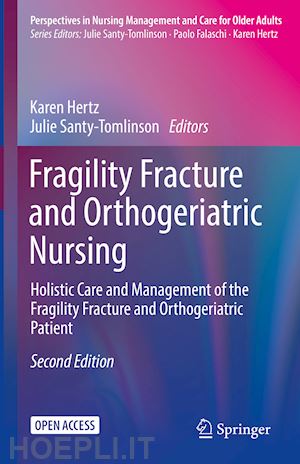
Questo prodotto usufruisce delle SPEDIZIONI GRATIS
selezionando l'opzione Corriere Veloce in fase di ordine.
Pagabile anche con Carta della cultura giovani e del merito, 18App Bonus Cultura e Carta del Docente
Global estimates suggest that there were 21 million men and 137 million women aged 50 years or more at high fracture risk in 2010. This incidence is expected to double by 2040, with the most significant increase in Asia. Fragility fracture is one of the foremost challenges for health care providers and thehe global demand for nursing care for patients with fragility fractures across the world is immense. Hip fracture is particularly challenging as these significant injuries often occur in frail older people requiring hospitalisation and orthopaedic surgery. Such injuries and associated surgery result in increased frailty, worsening health and wellbeing, pain, disability, reduced quality of life, loss of independence, and decreased life expectancy. Care providers need to understand the experience of fragility fracture from the perspective of patients and families so that direct improvements in care can be based on the perspectives of the users.
Expert care of patients following fractures that require hospitalisation and orthopaedic surgery involves skill in the care and treatment of frail older people as we as individuals with an injury and undergoing surgery. Nurses have a significant role in interdisciplinary collaborative care provided through orthogeriatric models of care. There is increasing evidence that such models significantly improve patient outcomes. High quality, evidence-based orthogeriatric care is increasingly shown to havepositive impact on outcomes for recovery, rehabilitation, and secondary prevention of further fracture.
This book significantly supports the aims and values of the Fragility Fracture Network and, as such, supports the learning needs of nurses and other allied health professionals which will enable a comprehensive approach to nursing practice in orthogeriatric and fragility fracture care.
Front matter.-1. Orthogeriatric and fragility fracture nursing: an Introduction.-2. Osteoporosis and the nature of fragility fracture nursing.-3. Frailty and Sarcopenia.-4. Preventing Falls.-5. Secondary Fracture Prevention.- 6. The nursing role in orthogeriatric comprehensive geriatric assessment (CGA) (Updated chapter with new authors) Louise Brent (Ireland).-7. Orthogeriatric Care in the Emergency and Perioperative Setting.-8. Early mobilisation and exercise after fragility fracture.-9. Pressure Ulcer Prevention.-10. Wound management.- 11. Nutrition and Hydration.-12. Delirium and other altered cognitive states.-13. Psychological wellbeing.-14. Rehabilitation.- 15. Family partnerships, patient and carer education and support.-16. Discharge and post-hospital care.-17. Ethical issues.-18. Orthogeriatric and fragility fracture care in the future.











Il sito utilizza cookie ed altri strumenti di tracciamento che raccolgono informazioni dal dispositivo dell’utente. Oltre ai cookie tecnici ed analitici aggregati, strettamente necessari per il funzionamento di questo sito web, previo consenso dell’utente possono essere installati cookie di profilazione e marketing e cookie dei social media. Cliccando su “Accetto tutti i cookie” saranno attivate tutte le categorie di cookie. Per accettare solo deterninate categorie di cookie, cliccare invece su “Impostazioni cookie”. Chiudendo il banner o continuando a navigare saranno installati solo cookie tecnici. Per maggiori dettagli, consultare la Cookie Policy.